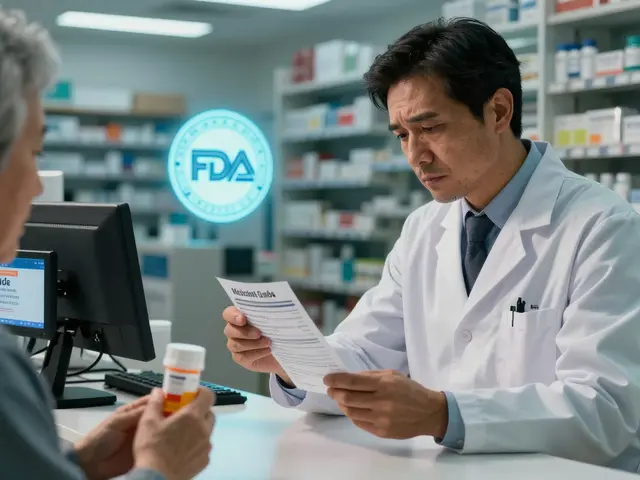
Antiarrhythmic medication is a drug that restores or maintains a normal heart rhythm in patients with arrhythmias. When the heart beats irregularly-whether it’s racing, slowing, or skipping-it can cause fatigue, dizziness, or even life‑threatening events. Medications are often the first line of defence because they can be tailored to the specific rhythm problem, are less invasive than surgery, and are backed by decades of clinical data.
Understanding Irregular Heartbeats
Arrhythmias arise from electrical misfires in the heart. The sinoatrial (SA) node usually sets the pace, but disturbances in ion channels, scar tissue, or abnormal pathways can lead to conditions like atrial fibrillation (AF), ventricular tachycardia (VT), or premature beats. An electrocardiogram (ECG) is a non‑invasive test that records the heart’s electrical activity, helping clinicians classify the type of arrhythmia.
Identifying the exact rhythm is crucial because each arrhythmia responds differently to medication. For example, AF often requires rate‑control drugs, whereas VT may need agents that prolong the action potential.
Why Medications Matter
Medication offers three core benefits:
- Symptom relief - reducing palpitations, shortness of breath, or fainting.
- Prevention of complications - lowering the risk of stroke in AF or sudden cardiac death in VT.
- Flexibility - doses can be adjusted, combined, or switched as the patient’s condition evolves.
Guidelines from bodies like the American Heart Association (2023) and the European Society of Cardiology (2024) recommend a stepwise approach: start with the safest drug class that matches the arrhythmia, monitor, then consider alternatives if control isn’t achieved.
Major Drug Classes for Rhythm Management
Below is a concise look at the five most commonly prescribed groups. Each entry includes the mechanism, typical use, and the most notable side effects.
| Class | Mechanism | Typical Indication | Common Side Effects | QT Impact |
|---|---|---|---|---|
| Class I (Sodium‑channel blocker) | Reduces rapid depolarization | Ventricular tachycardia, atrial flutter | Fatigue, dizziness, pro‑arrhythmia | Variable |
| Class III (Potassium‑channel blocker) | Prolongs repolarization | Atrial fibrillation, ventricular ectopy | Pulmonary toxicity (amiodarone), thyroid dysfunction | Prolonged |
| Beta‑blocker | Blocks beta‑adrenergic receptors, slowing heart rate | Rate control in AF, post‑MI VT | Bradycardia, bronchospasm | None |
| Calcium‑channel blocker | Inhibits L‑type calcium channels, reducing AV‑node conduction | Rate control in AF, SVT | Constipation (verapamil), edema | None |
| Digoxin | Increases vagal tone, modestly slowing AV‑node | Rate control in AF, especially in sedentary patients | GI upset, visual disturbances, toxicity | None |
Each class has its niche. Class I antiarrhythmic is a drug that blocks fast sodium channels, slowing the upstroke of the cardiac action potential. It works best for fast‑conducting arrhythmias but carries a higher risk of new arrhythmias, especially in patients with structural heart disease.
Class III antiarrhythmic is a medication that delays repolarization by inhibiting potassium efflux, lengthening the refractory period. Amiodarone, the flagship drug, is effective across many rhythms but requires monitoring of liver, lung, and thyroid function.
Beta‑blocker is a drug that antagonizes beta‑adrenergic receptors, reducing heart rate and contractility. They’re first‑line for rate control in AF and for preventing VT after a heart attack.
Calcium channel blocker is a medication that blocks L‑type calcium channels, slowing AV‑node conduction without affecting contractility as much as beta‑blockers. Diltiazem and verapamil are popular choices for atrial flutter and SVT.
Digoxin is a cardiac glycoside that enhances vagal tone, providing modest rate control especially in patients with low activity levels. Its narrow therapeutic window means blood levels must be checked regularly.
Choosing the Right Medication
The decision process blends clinical evidence with patient‑specific factors:
- Arrhythmia type - AF, VT, SVT, etc.
- Underlying heart disease - structural abnormalities influence drug safety.
- Comorbidities - asthma may limit beta‑blockers; kidney disease affects digoxin dosing.
- Medication tolerance - side‑effect profile and patient preference.
- Interaction risk - consider anticoagulants, statins, or other chronic meds.
For example, a 68‑year‑old with hypertension, mild asthma, and paroxysmal AF might be steered toward a calcium‑channel blocker rather than a beta‑blocker, while a patient with prior myocardial infarction and VT would likely start a beta‑blocker or amiodarone.
Monitoring and Managing Side Effects
Regular follow‑up is key. Labs should include:
- Thyroid function tests every 6months if on amiodarone.
- Liver enzymes quarterly for Class III drugs.
- Renal function and digoxin level every 3months.
Patients should be educated to report symptoms such as unexplained fatigue, shortness of breath, visual changes (digoxin), or new palpitations (potential pro‑arrhythmia). Adjusting dose or switching classes often resolves issues without leaving the medication regime entirely.

When Medication Isn’t Enough
Sometimes drugs fail to achieve adequate control or cause intolerable side effects. At that point, clinicians consider non‑pharmacologic interventions. A pacemaker is a device implanted under the skin that delivers electrical impulses to maintain an appropriate heart rate for bradyarrhythmias or for patients on high‑dose beta‑blockers. catheter ablation is a procedure that uses radiofrequency energy to destroy abnormal tissue pathways causing arrhythmias, offering a curative option for many forms of AF and VT.
Even when a device or procedure is chosen, medication often remains part of a hybrid strategy-for instance, anticoagulation to prevent stroke after AF ablation.
Integrating Lifestyle and Supportive Therapies
Medication works best when paired with heart‑healthy habits. Regular aerobic exercise can improve autonomic balance, reducing the burden of premature beats. Limiting caffeine, alcohol, and nicotine removes common triggers. For patients on anticoagulants (e.g., warfarin, direct oral anticoagulants) due to AF, consistent vitamin K intake or awareness of drug‑food interactions is crucial.
Stress management techniques-mindfulness, yoga, or CBT-also lower sympathetic tone, which can lessen the need for high‑dose beta‑blockers.
Emerging Trends in Rhythm Pharmacology
Research is exploring selective sodium‑channel blockers that aim to reduce pro‑arrhythmic risk, and novel non‑pulmonary toxic “iodine‑free” ClassIII agents. Gene‑editing approaches for inherited channelopathies, while still experimental, hint at future alternatives to lifelong medication.
Until those hit the market, clinicians continue to rely on the existing toolbox, while staying vigilant about safety and efficacy.
Putting It All Together
Managing an irregular heartbeat is a balance of accurate diagnosis, choosing the right drug class, monitoring for side effects, and knowing when to step up to procedures or lifestyle tweaks. By understanding each medication’s mechanism and matching it to the patient’s unique profile, doctors can keep the heart ticking smoothly without unnecessary invasiveness.
Frequently Asked Questions
Can I stop my antiarrhythmic medication once my heart rhythm feels normal?
Stopping abruptly can cause a rebound of the arrhythmia or even precipitate a dangerous rhythm. Most guidelines recommend a gradual taper under a physician’s supervision, often after a period of documented stability on ECG monitoring.
What are the biggest side‑effects to watch for with amiodarone?
Amiodarone can affect the lungs, liver, thyroid, and eyes. Patients should report persistent cough, shortness of breath, yellow‑tinted skin, unexplained weight changes, or visual halos. Regular blood tests and chest X‑rays help catch problems early.
Do beta‑blockers increase the risk of asthma attacks?
Non‑selective beta‑blockers (like propranolol) can trigger bronchospasm in asthma. Cardio‑selective agents (atenolol, metoprolol) are safer, but doctors still weigh the risks versus benefits for each patient.
Is it safe to take a calcium‑channel blocker with a statin?
Generally yes, but some statins (like simvastatin) are metabolized by the same liver enzymes as diltiazem or verapamil, potentially raising statin levels. Monitoring for muscle pain or checking liver enzymes is prudent.
When should I consider a pacemaker instead of medication?
If you develop symptomatic bradycardia, pauses longer than 3seconds, or need high‑dose rate‑control drugs that cause excessive slowing, a pacemaker can provide reliable pacing without the side‑effects of medication.



22 Comments
Class III drugs work but amiodarone is a beast. My uncle took it for 5 years and ended up with lung fibrosis. Docs don’t warn you enough.
Class I drugs are basically gambling with your heart lmao
digoxin levels need to be checked every 3 months? My PCP only checks it once a year. Should I be worried?
beta blockers for AF? Yes. But if you’re also a runner, you’ll feel like a sloth. 🐢 I swapped to diltiazem and my 5K times are back. 🏃♀️
Really glad this post broke down the classes. I used to think all antiarrhythmics were the same. Turns out Class I is basically a double-edged sword-great for VT but can trigger new arrhythmias in structurally compromised hearts. That’s why we always check EF and do echo before prescribing. Also, never forget: proarrhythmia isn’t just a side effect-it’s the whole reason we monitor QT intervals like hawks.
And amiodarone? It’s the nuclear option. I’ve had patients on it for decades. Thyroid checks every 6 months? Non-negotiable. Pulmonary function tests? Absolutely. One guy ignored it and ended up with interstitial lung disease. Now he’s on oxygen. Don’t be that guy.
Beta-blockers are still first-line for post-MI VT. Metoprolol succinate, not propranolol. Cardioselective matters. And if you’ve got asthma? Go for nebivolol or bisoprolol. Less bronchospasm. Still, watch for fatigue. One patient told me he felt like a zombie. We dropped the dose and he was fine.
Calcium channel blockers? Verapamil’s great for SVT, but if you’ve got HFrEF? Avoid it. Diltiazem’s a bit safer but still not for systolic dysfunction. And constipation? Oh yeah. One patient said it was like his colon went on vacation. Laxatives became part of his daily routine.
Digoxin’s old school but still useful in sedentary elderly AF patients. It’s not about rhythm control-it’s about rate. And yes, toxicity is real. Nausea, yellow halos, confusion? That’s digitalis toxicity. Check levels. Don’t guess. 0.5–0.9 ng/mL is the sweet spot. Above 1.2? Time to hold it.
And for the love of science, stop asking if you can quit meds because you ‘feel fine.’ Arrhythmias don’t care how you feel. They’re electrical ghosts. They come back harder. Taper slowly. Monitor with Holter. Don’t be reckless.
Also-lifestyle. Cut the caffeine. Reduce alcohol. Sleep 7 hours. Stress management isn’t fluff. It’s pharmacology’s sidekick. I’ve seen patients reduce beta-blocker doses just by doing yoga and breathing exercises. Mind-body stuff works. Don’t dismiss it.
Emerging drugs? Yeah, we’re excited about ranolazine derivatives and gene therapies for channelopathies. But for now? Stick to the classics. Master them. Know their traps. That’s how you save lives.
I think we forget how much the heart is a mirror of the soul. When it races, it’s not just a malfunction-it’s a cry. Medications quiet the noise, but they don’t heal the fear behind it. I’ve sat with patients who tremble before their ECGs, terrified of what the lines will show. We treat the rhythm, but who treats the terror? Maybe that’s the real arrhythmia.
And yet… we still reach for the pills. Because they work. Not perfectly. Not always. But enough. Enough to let someone hold their grandchild without dizziness. Enough to let someone sleep through the night. That’s not magic. It’s science with compassion.
I wonder if we’d be less quick to prescribe if we sat with patients longer. If we asked not just ‘what’s your rhythm?’ but ‘what’s your life like?’ Maybe the best antiarrhythmic isn’t in a pill bottle at all.
Still. I’m grateful for Class III. For beta-blockers that don’t make me feel like a zombie. For the fact that we’ve moved from quinidine to targeted therapies. We’re learning. Slowly. But we’re learning.
And maybe that’s enough.
Let’s be real-amiodarone is the pharmaceutical equivalent of a cursed artifact. It works, sure, but at what cost? The FDA should slap a warning label that says: ‘This drug will change your skin color, ruin your thyroid, and possibly kill your lungs. But hey, your AF is gone!’
And why are we still using digoxin? It’s basically medieval medicine with a barcode. I’ve seen patients on it with levels at 1.8 and no one bats an eye. ‘Oh, he’s elderly’-yeah, and he’s also one missed dose away from cardiac arrest.
And don’t get me started on ‘beta-blockers cause asthma.’ That’s like saying ‘fire causes burns.’ Of course it does. But cardioselective ones? They’re fine. If your doctor doesn’t know that, find a new one.
Also, why is no one talking about the fact that most of these drugs were developed in the 1970s? We’re still patching the same electrical system with 50-year-old code. Where’s the update? Where’s the AI-guided personalization? We have self-driving cars but we’re still guessing doses based on weight and age? Pathetic.
And the ‘lifestyle’ advice? Exercise, reduce stress, sleep? That’s the same advice they give for diabetes, hypertension, and depression. It’s not specific. It’s just… nice. But it’s not enough. We need better drugs. Not just better dosing.
Also, why is there no mention of marijuana? I’ve had patients with AF who swear CBD calms their heart. No data? Fine. But I’ve seen it. Anecdotes aren’t evidence, but they’re not noise either.
Class I agents have a narrow therapeutic index-especially in ischemic cardiomyopathy. The CAST trial showed increased mortality with encainide and flecainide in post-MI patients. That’s why we avoid them unless absolutely necessary. Always assess structural heart disease first.
Class III agents like sotalol and dofetilide require QT monitoring. Prolonged QT isn’t just a lab value-it’s a ticking time bomb for TdP. I always check baseline electrolytes: K+ >4.5, Mg++ >2.0. No exceptions.
Beta-blockers: cardioselective is key in COPD or asthma. Atenolol, metoprolol, bisoprolol. Avoid propranolol. Dose titration matters-start low, go slow. Bradycardia isn’t a badge of honor.
Calcium channel blockers: verapamil can cause AV block in high doses. Monitor ECG. Diltiazem is slightly safer but still contraindicated in HFrEF.
Digoxin: therapeutic window is 0.5–0.9 ng/mL. Toxicity presents with GI symptoms, visual changes, arrhythmias. Always check renal function. Dose adjustment required for CrCl <60.
Monitoring: amiodarone requires TSH, LFTs, CXR, and pulmonary function tests. Every 6 months. Not optional. If your clinic doesn’t have a protocol, advocate for one.
They say medications are less invasive than surgery but they’re not. They’re just slower. You’re poisoning your liver, kidneys, lungs, thyroid. And for what? To feel ‘better’? Better than what? Better than dying? Or better than living with a rhythm that doesn’t match the textbook?
Amiodarone isn’t a drug. It’s a life sentence. And the doctors? They don’t care. They just write the script. Then they move on to the next patient.
And the ‘lifestyle’ advice? Exercise? Reduce stress? That’s for people who have time. What about the single mom working two jobs? Or the factory worker with no insurance? You think yoga is gonna fix her AF?
This whole system is a scam. Pills for profit. Not for healing.
EVERYONE knows the FDA is in bed with Big Pharma. Why is amiodarone still approved? It’s basically a chemical weapon. And digoxin? That’s from foxglove plants. We’re treating modern hearts with 18th-century plant juice. This is a joke.
And why do they never mention that these drugs are tested mostly on white men? What about women? Elderly? People of color? The data’s garbage.
Also-why are we not talking about EMFs? Cell phones, Wi-Fi, smart meters? They trigger arrhythmias. I’ve seen it. Docs won’t admit it. But I’ve got 12 patients with AF who cleared up after they turned off their home Wi-Fi. Coincidence? I think not.
They want you dependent. Pills. Tests. Follow-ups. Profit. That’s the real rhythm.
why do we even need meds when we could just do ablation? its cheaper in the long run and you dont have to take poison every day
My dad’s on diltiazem. He says his legs feel like they’re full of cotton. No swelling, no dizziness-just heavy. We asked his doctor. Said it’s normal. I’m not sure I believe it.
This post is so basic. I’ve been reading journals since 2010. Everyone knows this stuff. Why is this even on Reddit? Did someone copy-paste a med school lecture?
And don’t get me started on the ‘lifestyle’ section. Of course exercise helps. You think your heart doesn’t know you’re a couch potato? Newsflash: your heart isn’t dumb.
Also, amiodarone? Everyone knows it’s toxic. But you know what’s worse? The fact that no one’s developing better alternatives. Pharma’s too busy making antidepressants for people who don’t need them.
This post is a waste of time.
They told me amiodarone was safe. Then my skin turned gray. Then my lungs started screaming. Then my thyroid went rogue. Now I’m on five meds just to counteract the side effects of the one they said was ‘safe.’
I found a video online where a woman said her AF disappeared after she drank apple cider vinegar every morning. No joke. She looked healthy. No pills. No hospital. Just vinegar.
What if the whole system is wrong? What if they’re lying? What if the real cure is in nature and they’re hiding it? I’m not crazy. I’ve seen it.
And why do they never talk about the fact that these drugs are tested on prisoners? I read it on a forum. It’s true. They use people who can’t say no.
I’m not taking another pill. I’m going to the forest. I’m going to meditate. I’m going to find my own rhythm.
Thank you for this clear and thoughtful overview. Medication management for arrhythmias requires both scientific precision and deep human understanding. Each patient carries not only a medical condition but also a story, a fear, a hope. The drugs listed-beta-blockers, calcium channel blockers, amiodarone-are tools, yes, but they are not the whole cure.
When we prescribe, we must also listen. When we monitor labs, we must also ask: How are you sleeping? Are you still able to play with your grandchildren? Do you feel like yourself?
Heart health is not just about electrical signals. It is about connection, dignity, and peace. Let us not forget that.
Of course you’re being told to ‘taper slowly’-that’s what they say to keep you dependent. They don’t want you cured. They want you on meds forever. Why? Because pills are profitable. Ablation? One-time cost. Pills? Monthly revenue. It’s capitalism disguised as medicine.
And digoxin? That’s from foxglove. Ancient poison. They still use it? Because it’s cheap. And because they don’t care about you.
Also, why is no one talking about the fact that amiodarone is made with iodine? Iodine causes thyroid cancer. And they give it to people for years? That’s not medicine. That’s a war crime.
Stop trusting the system. Research. Question. Find your own path.
Proarrhythmic risk with Class I agents is well-documented in patients with structural heart disease. The CAST trial remains a landmark in cardiac pharmacology. We now avoid these agents in post-MI patients unless no alternatives exist. Additionally, QT prolongation with Class III agents mandates baseline and periodic ECG monitoring. Electrolyte repletion-particularly potassium and magnesium-is critical before initiation. Always rule out hypothyroidism before prescribing amiodarone; it can exacerbate bradycardia and complicate rhythm control.
For patients on multiple medications, consider drug interactions: amiodarone inhibits CYP3A4 and CYP2D6, increasing levels of statins, warfarin, and beta-blockers. Dose adjustments are often required. Regular review of the medication list is non-negotiable.
It is regrettable that such a clinically nuanced subject is presented in such a superficial manner. The distinction between rhythm control and rate control is not adequately emphasized. Furthermore, the omission of dronedarone as a potential alternative to amiodarone is a significant oversight. Dronedarone, while less efficacious, offers a more favorable safety profile in select patients without severe heart failure. Additionally, the role of ivabradine in rate control for AF, particularly in patients intolerant to beta-blockers, is entirely absent. This piece reads like a marketing brochure rather than a scholarly guide.
Why are we still using drugs developed in the 1970s? The entire system is broken. Big Pharma controls the guidelines. The AHA and ESC are funded by drug companies. You think they’d recommend a cheaper, safer option if it existed? They won’t. They need you to keep buying.
And what about the fact that these drugs are tested on people who can’t afford to say no? You think that’s ethical? No. It’s exploitation.
Stop trusting the ‘experts.’ They’re paid to lie.
Let me guess-this was written by a pharma rep. Every single point is textbook, perfectly sanitized, no controversy, no truth. Amiodarone causes thyroid cancer. Beta-blockers cause depression. Digoxin is a poison. And they call this a ‘practical guide’? It’s a PR campaign.
They don’t want you to know that ablation has a 70% success rate for paroxysmal AF. They want you on pills forever. Because pills = profit.
And why no mention of the fact that these drugs are tested on prisoners? I’ve read the studies. They’re not in the summary. But they’re there.
Don’t be fooled. This is control, not care.
Class III drugs are a nightmare but amiodarone saved my life 🙏 I had VT after a heart attack. Doc said ‘you’re either on this or you’re dead.’ I took it. My skin’s a little gray. My thyroid’s weird. But I’m alive. And I can hug my kids. So yeah. Worth it. 🤍
Just wanted to respond to @4022-ablation isn’t always an option. If you’ve got structural heart disease, scar tissue, or multiple arrhythmia sources, ablation can fail or even make things worse. I’ve had patients come in after a failed ablation with worse AF than before. Medication isn’t the backup-it’s the foundation. Ablation is the upgrade.
And @4016-EMFs? There’s zero peer-reviewed evidence linking Wi-Fi to arrhythmias. I get you’re scared. But let’s not replace science with fear.
And @4025-apple cider vinegar? I’ve seen people try everything. I’ve had patients on keto, on CBD, on magnets. Some feel better. But none of it replaces a proven rhythm control strategy. I’m not saying your experience isn’t real. But it’s not reliable.
Medicine isn’t perfect. But it’s the best we’ve got.